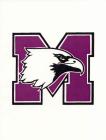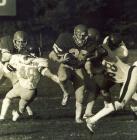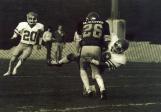2
The McMaster Marauders first football season was in the early part of the 20th century in 1901, but before McMaster stepped on the field to play McMaster had to get a football program. The first reverence of football at McMaster can be dated back to 1898, when a letter was written by the students, expressing desire to play football, and they needed a ball by the association. This matter was resolved very quickly, when the association denied the request, citing that it was too late to start in the season, and there was no football in 1898.At the turn of the century, football was first played at McMaster by a group of fourth year students in which they played another group of students in which the fourth year students defeated the freshmen and sophomores 10-5. This game was played on December 6, 1900.
As stated earlier, McMaster's first season was in 1901, in which they want to participate in the Mulock Cup football series that was sponsored by the University of Toronto that was played at U of T. Unfortunately for McMaster, they were not allowed to play in the Mulock Cup, so McMaster decided to play three exhibition games. In the first season, McMaster went 1-2. The only win that McMaster compiled in that season was a 22-6 victory against the Toronto Victorias.
Before the season started in 1902, McMaster decided to enter the intermediate division of the Canadian Intercollegiate Rugby Football Union (CIRFU). In their first season in the CIRFU, McMaster's season ended very quickly when U of T defeated McMaster 15-1. With that defeat McMaster would end up playing exhibition games for the rest of the season.
3
In 1910, McMaster decided to withdraw from the CIRFU for that season, because they had no practice field. But in the following season McMaster returned to the CIRFU. The next significant year in McMaster football history was in 1913 when the football program decided to forfeit the second half of their games due to fact that they had no replacements players to replace the ones that were hurt.From 1914 to 1919, there was no CIRFU due to the fact that World War I was happening. The CIRFU and McMaster football returned to the field in the 1919 season, and during that season, McMaster decided to play in the junior division of the CIRFU in which they finished that season with a 0-3 record.
4
During the 1920s McMaster was inconsistent to say the least. In this decade, McMaster went 15-23-1 with three playoff appearances in 1921, 1922, and 1928. McMaster won their playoff appearance in 1922, when they won their group. At the end of the 1920s, McMaster decided to relocate their playing field to Hamilton, and in 1930 played their first game in Hamilton on October 18, 1930 in which they defeated Western University by the score of 14-3.In the 1930s, McMaster went 35-13 with six playoff appearances. The years in which they won the intermediate CIRFU championship was in 1935 and 1937. After the 1939 season, war time efforts ceased the operations of the CIRFU once again, so there was no football squad in the 1939 season, but during the rest of the war years from 1940-1945, McMaster still produced football squads and played games against local clubs, even winning the Hamilton Junior league championship in 1943.
When intercollegiate action returned in 1945, McMaster won the west division. Also during the same season, McMaster was starting to be known as the Rams for four seasons until the end of the 1948 season. At the end of the 1948 season, McMaster decided that they wanted to be known as the Marauders. Another thing that happened is when McMaster returned to the intercollegiate ranks they only won five games in that time span.
5
Before the start of the 1950 season, McMaster decided to enrolled to be part of the Senior Intercollegiate Football League (SIFL) with McGill, Western, Queen's and Toronto. With much discussion and persuasion from McGill, McMaster tried to enter the SIFL, but was denied due to the fact that they were not good the previous season. In the 1950 season, McMaster with their denied application finished the season with a perfect 6-0 record, winning the championship that year.In the 1951 season, McMaster entered the Ontario Rugby Football Union (ORFU) after being denied once again by the SIFL. Going into the first season, McMaster finished the season with a 2-4 record. Even though with that record, McMaster proved that they could play with the other teams in the SIFL, and in 1952, the SIFL agreed to let McMaster be in the SIFL.
In their first season in the SIFL they were not allowed to participate in that season Yates Cup championship, but were allowed to be part of the Yates Cup if they make it that far. The McMaster experiment in the SIFL only last two seasons, due to two zero win seasons (in 1952, they went 0-5 and in 1953, McMaster went 0-6).
6
After two winless seasons, their SIFL application was denied for the 1954 season. With McMaster out of the SIFL, the Marauders spent the 1954-1956 seasons regrouping and playing exhibition games against everyone expect for the teams that are part of the SIFL.Before the start of the 1957 season, McMaster became part of the Ontario Intercollegiate Football Conference (OIFC). The original members of this conference were; Carleton, Ontario Agricultural College (OAC), University of Ottawa, Royal Military College, and the University of Waterloo. This conference was made in part of senior conference play, in which these teams that were mentioned were not allowed to participate.
7
In the time in which McMaster was in the OIFC (1957-1966), they won three straight league championships from 1962-1964.The next significant season in McMaster history was during the 1967 season, in which McMaster finished the season with a perfect 7-0 record. In the playoffs, McMaster would play the St. Francis Xavier X-Men in the first ever Atlantic Bowl that was played in Halifax. In the game, only one touchdown was scored and it was by McMaster player, Dick Waring as they won by the score of 7-0. With that win McMaster would go on to play in their first Canadian College Bowl in Toronto, against the Alberta Golden Bears, who had defeated them 11-1 in the pre-season that year. So it was safe to say that McMaster was looking for redemption against the Golden Bears.
In the national championship game itself, McMaster put up a hard fight, but ultimately came up short as McMaster was defeated 10-9 by Alberta. The turning point of the game was during the early part of the fourth quarter when Alberta kicked an 18-yard field goal which seals the win for Alberta. This championship run was the only one that McMaster had in their time within the CCIFC.
8
Trophy presentation of the 1967 Atlantic Bowl.Circa 1967
Halifax, Nova Scotia, Canada
 Credits:
Credits:Maurice Slaunwhite
9
Roster during the 1967 Canadian College Bowl.25 November 1967
Varsity Stadium, Toronto, Ontario, Canada

10
McMaster next conference that they joined was the Ontario University Athletics Association (OUAA) in which they were a part of from 1971-1973. McMaster was in the same division as Guelph and Wilfrid Laurier, known as the Central Division. During McMaster's time in the OUAA, McMaster's best season was during the 1971 season in which McMaster finished the season with 5-2 record and made the playoffs, but did not make it very far as they were defeated early in the playoffs by the Ottawa Gee-Gee's 18-9. The following two seasons, McMaster had two dismal seasons, with a combined 4-9 record.McMaster's next conference was the Ontario-Quebec Intercollegiate Football Conference (OQIFC), in which they were they were apart of until the end of the end of the 1979 season. McMaster was in the same division as Guelph, Toronto, and York just to name a few. McMaster's best seasons in the OQIFC was their first season in 1974 in which they finished with a 3-4 record, but still managed to make it to the Yates Cup playoffs. In the semi-final game against the Laurier Golden Hawks, McMaster lost rather badly by the score of 40-2. For the rest of their time within the OQIFC, McMaster compiled a 6-29 record with two winless seasons in 1975 and 1979.


